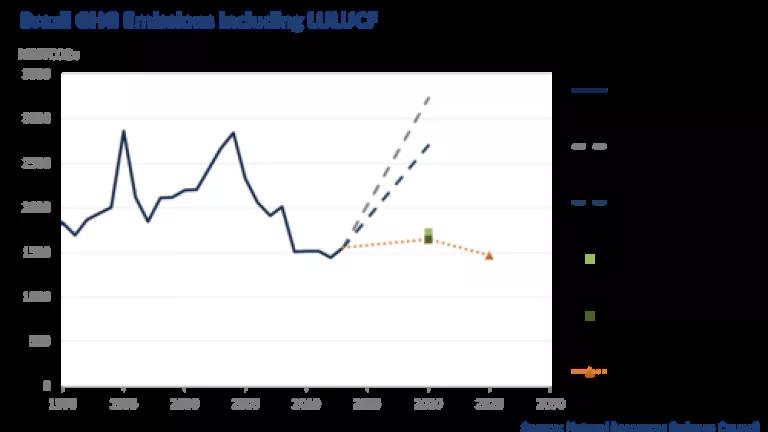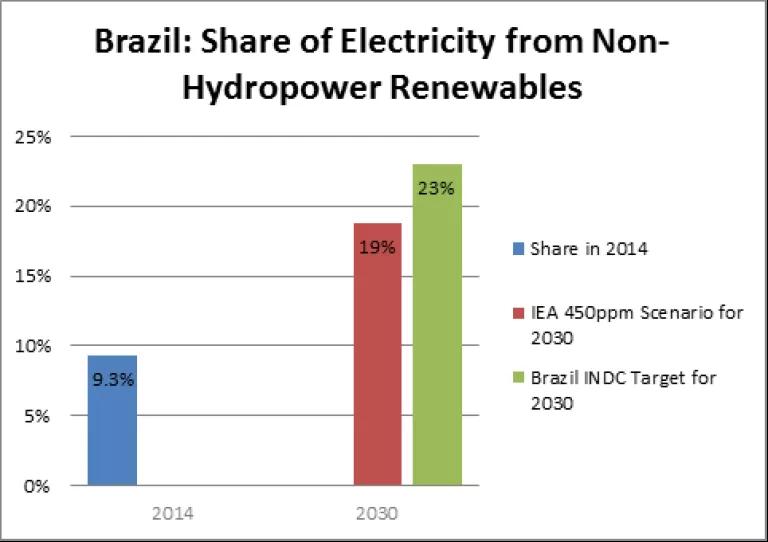
Brazil announced at the UN General Assembly that the country would reduce greenhouse gas emissions 37 percent below 2005 levels by 2025, with an "indicative target" of 43 percent reduction by 2030. This makes Brazil the largest developing country to set an economy-wide emissions target in its climate pledge.
This announcement was welcomed by Brazilian NGOs, noting that the country could be even more ambitious. As Carlos Rittl from the Brazilian Climate Observatory stated:
"The target announced by President Dilma Rousseff puts Brazil in a position to contribute for a good agreement in Paris. However, it still is less than what is needed for the climate and for the struggling Brazilian economy. We can do more."
This target shows a reduction from where the country estimated its emissions would be headed just a few short years back (see figure).*
Brazil's emissions in 2012 were 41 percent below 2005 levels - but the emissions reduction pledge is still impressive given Brazil's per capita income and the potential uptick in emissions if future economic growth isn't driven towards a low-carbon scenario. What it translates into is a pledge where Brazil's growth over the next decade will not increase emissions. To meet this target Brazil will have to increase its renewable energy penetration and continue to slow its deforestation emissions.
Increasing Renewable Energy
To keep emissions low while sustaining growth, Brazil has proposed that 45 percent of the total energy mix will need to come from renewables by 2030, up from 40 percent in 2014. The largest increase will come in terms of electricity generation where they have outlined a target to have 23 percent of power generation come from renewables (not including hydropower) by 2030. This is an impressive growth since less than 10 percent of electricity came from these sources in 2014 (see figure).


Addressing Deforestation
Despite the impressive goals with regards to renewable energy, analysts have pointed out that Brazil's reforestation goals could be raised from 12 million hectares to 20 million and the country should do more on deforestation. The Brazilian action plan commits to zero illegal deforestation by 2030, but this appears to be a step back from a previous commitment to end illegal deforestation by 2015. In addition, the plan doesn't suggest what will be done on all deforestation (not just illegal). As Environmental Defense Fund highlights: "While the announcement did not go into detail, it is clear that these targets can only be met if Brazil sustains the 80% reduction in Amazon deforestation by 2020 in its National Climate Change Policy, passed by Congress in 2009." In fact, a number of groups have pointed out that Brazil should commit to zero deforestation from all sources (legal and illegal) by 2030 as a large number of countries and companies have committed to. The pledge is also sparse on details about emissions from the agricultural sector, and more details would be helpful.
Brazil can go further
The Climate Observatory, a group of NGOs in Brazil, has suggested that Brazil could cut greenhouse gas emissions even further in their suggested climate pledge, to what represents a "fair share" of action for keeping global temperature rise to less than 2 degrees Celsius. They have outlined that Brazil could cut emissions to 57 percent compared to 2005 levels by eliminating deforestation and significantly expanding wind and solar. As others have noted, Brazil has more work to achieve this target.
---------------------
Brazil is one of the more than 140 countries accounting for around 90 percent of global emissions that have already submitted their climate pledges. On top of that, city and state leaders around the world, including the Mayors of Buenos Aires, Rio de Janeiro, and Sao Paulo, have joined city-level commitments to reducing their emissions. With so much momentum building for a successful agreement in Paris, Brazil's commitment to long term reductions is hopefully just a starting point for more ambitious action now that both developing and developed countries are coming to the table.
----------------------
Sources in figure:
* Brazil's Ministry of Science, Technology and Innovation via Carbon Brief
** Renewable energy penetration in Brazil based upon the International Energy Agency's 450ppm scenario from the World Energy Outlook, 2014.
